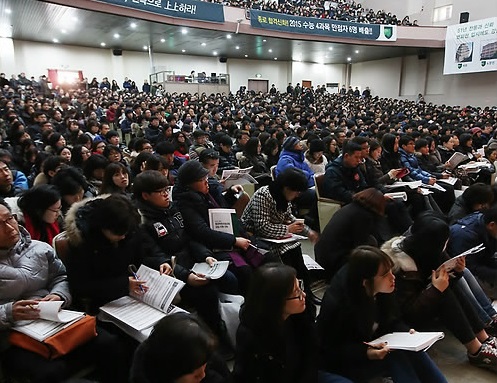- California Assembly OKs highest minimum wage in nation
- S. Korea unveils first graphic cigarette warnings
- US joins with South Korea, Japan in bid to deter North Korea
- LPGA golfer Chun In-gee finally back in action
- S. Korea won’t be top seed in final World Cup qualification round
- US men’s soccer misses 2nd straight Olympics
- US back on track in qualifying with 4-0 win over Guatemala
- High-intensity workout injuries spawn cottage industry
- CDC expands range of Zika mosquitoes into parts of Northeast
- Who knew? ‘The Walking Dead’ is helping families connect
Unemployment rate for recent college grads rises in US
WASHINGTON (AP) — The job prospects for recent college graduates deteriorated slightly last year despite an improvement in the overall job market, the Labor Department said Thursday.
The unemployment rate for Americans age 20 to 29 who received a four-year or advanced degree last year rose to 12.4 percent from 10.9 percent in 2013. But the figures are volatile, and many recruiters and campus officials say hiring this spring will be strong.
For graduates with bachelor’s degrees, unemployment climbed to 14.9 percent last year from 11.5 percent in 2013. For those with advanced degrees, unemployment slid to 5.4 percent from 9.3 percent.
Unemployment for women graduates — bachelor’s and advanced degrees combined — rose to 12.1 percent last year from 9 percent in 2013. For men, the rate dropped to 13 percent from 13.7 percent in 2013.
Overall, the economy generated 3.1 million jobs last year, the most since 1999. The overall unemployment rate has fallen to 5.5 percent in March from 6.7 percent at the end of 2013.
Still, by some measures recent college grads are struggling.
In a report last year, researchers Bart Hobjin and Leila Bengali at the Federal Reserve Bank of San Francisco found that wages for recent college graduates haven’t kept up with overall wages since the Great Recession. Between 2007 and 2014, median wages for all full-time workers rose 15 percent. For recent college grads, they rose just 6 percent. The same thing happened after the 2001 recession. College grads’ wages lagged behind everyone else’s as the economy recovered, they note.
A survey by Michigan State University survey found that 62 percent of employers were planning to keep starting wages flat for college grads compared to last year, while 37 percent planned to raise starting salaries. The increases tended to range from 3 percent to 5 percent.
















